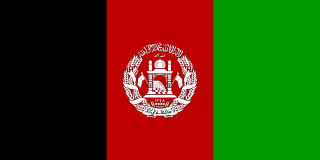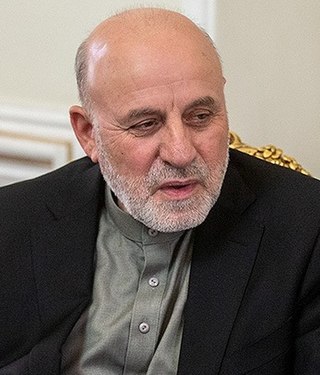Related Research Articles

The government of Afghanistan is currently disputed following the effective collapse of the Islamic Republic of Afghanistan during the fall of Kabul to Taliban forces on 15 August 2021 and the subsequent re-establishment of the Islamic Emirate of Afghanistan which now exercises de facto control over most of the country. On 7 September 2021 the Taliban officials in de facto control of most of Afghanistan announced a new interim government headed by Mullah Mohammad Hassan Akhund as Prime Minister. The government is subject to the oversight of the Taliban's Supreme Leader,Haibatullah Akhundzada. As of 8 September 2021,the Islamic Emirate of Afghanistan has not yet been formally recognized as the de jure government of Afghanistan by any other country. The representatives appointed by the Islamic Republic of Afghanistan continue to represent the country at the United Nations. These representatives have refused to recognize the Taliban appointed government and have urged other countries to not recognize this government either.

Hamid Karzai is an Afghan politician who served as the fourth president of Afghanistan from July 2002 to September 2014,including as the first elected president of the Islamic Republic of Afghanistan from December 2004 to September 2014. He previously served as Chairman of the Afghan Interim Administration from December 2001 to July 2002. He is the chief (khān) of the Popalzai Durrani tribe of Pashtuns in Kandahar Province.

This article on the history of Afghanistan covers the period from the fall of the Najibullah government in 1992 to the end of the international military presence in Afghanistan.

Mohammad Qasim Fahim was an Afghan military commander and politician who served as Vice President of Afghanistan from June 2002 until December 2004 and from November 2009 until his death. He was considered a powerful and influential figure during the Karzai Administration.
Mohammad Yahya Maroofi,is an ethnic Pashtun from the Barakzai tribe. His family is from District Maroof Kandahar,Afghanistan.

The Transitional Islamic State of Afghanistan (TISA),also known as the Afghan Transitional Authority,was the name of the temporary transitional government in Afghanistan put in place by the June 2002 loya jirga. The Transitional Authority succeeded the original Islamic State of Afghanistan,and preceded the Islamic Republic of Afghanistan (2004–2021).

The Council of Ministers of the Islamic Emirate of Afghanistan is the executive body of the government of Afghanistan,responsible for day-to-day governance and the implementation of policy set by the Leadership. It is headed by the prime minister—who serves as the nation's head of government—and his deputies,and consists of the heads and deputy heads of the government ministries.

The Northern Alliance,officially known as the United Islamic National Front for the Salvation of Afghanistan,was a military alliance of groups that operated between early 1992 and 2001 following the dissolution of the Soviet Union. At that time,many non-Pashtun Northerners originally with the Republic of Afghanistan led by Mohammad Najibullah became disaffected with Pashtun Khalqist Afghan Army officers holding control over non-Pashtun militias in the North. Defectors such as Rashid Dostum and Abdul Momim allied with Ahmad Shah Massoud and Ali Mazari forming the Northern Alliance. The alliance's capture of Mazar-i-Sharif and more importantly the supplies kept there crippled the Afghan military and began the end of Najibullah's government. Following the collapse of Najibullah's government the Alliance would fall with a Second Civil War breaking out however following the Islamic Emirate of Afghanistan's (Taliban) takeover of Kabul,The United Front was reassembled.
Taj Mohammad Wardak is an Afghan politician,from the Pashtun ethnic group. He spent some of the period of the Taliban's administration in the United States of America,and became an American citizen.
The following lists events that happened during 2002 in Afghanistan.
The following lists events that happened during 2004 in Afghanistan.

The Afghan Interim Administration (AIA),also known as the Afghan Interim Authority,was the first administration of Afghanistan after the fall of the Taliban regime and was the highest authority of the country from 22 December 2001 until 13 July 2002.

Mohammad Haneef Atmar is an Afghan politician and former KhAD agent. He served as the Minister of interior until he was removed from the Ministry by Hamid Karzai in the wake of attacks on the June 2010 Afghan Peace Jirga. Before that he worked with several international humanitarian organisations and served as Minister of Rural Rehabilitation and Development and Minister of Education. In 2011,he was part of the Right and Justice party. During his time in office,he has visited several countries to get funding to stabilise Afghanistan.

Mohammad Umer Daudzai is a politician in Afghanistan,most recently having served as President Ashraf Ghani's Special Envoy for Regional Consensus Building on Peace and as Head of the High Peace Council (HPC) Secretariat for a few months,until he was appointed as President Ghani's Campaign Manager for the 2019 Presidential elections. After a career with international non-governmental organizations including the United Nations Development Program in Geneva,Daudzai started work as two term Chief of Staff of Afghan President Hamid Karzai from 2003 to 2005 and then from 2007 to around 2010. From 2005 until 2007,President Karzai appointed him as Afghan Ambassador in Iran. He then served as the Afghan Ambassador to Pakistan,tasked with advancing efforts to reach a political solution to the war in Afghanistan. In September 2013,Daudzai was asked to serve as Afghan Minister of Interior in Kabul and ensure security for the challenging 2014 presidential elections.
Mohammad Yousef Pashtun is an Afghan technocrat and politician. He served as Minister of Urban Development and Housing for two terms and as Governor of Kandahar province in 2003,replacing Gul Agha Sherzai under President Hamid Karzai's administration. In 2010,he was appointed as Senior Adviser to President Karzai on Construction,Mines,Water &Energy. In 2014,minister Pashtun continued to serve as Senior Adviser to President Ashraf Ghani. Yِousef Pashtun is also chairing the Kabul New City Development Authority Board.

Abdullah Abdullah is an Afghan politician who led the High Council for National Reconciliation (HCNR) from May 2020 until August 2021,when the Afghan government was overthrown by the Taliban. The council had been established to facilitate peace talks between the Islamic Republic of Afghanistan and the Taliban insurgents. Abdullah served as the Chief Executive of Afghanistan from September 2014 to March 2020,and as Minister of Foreign Affairs from December 2001 to April 2005. Prior to that,he was a senior member of the Northern Alliance,working as an adviser to Ahmad Shah Massoud. He worked as an ophthalmologist and medical doctor in the 1980s.

The Karzai administration was the government of Afghanistan under President Hamid Karzai,who became the head of state of Afghanistan in December 2001 after the Taliban government was overthrown. Karzai was appointed at the 2002 Loya Jirga as the Interim President of the Afghan Transitional Administration. After the 2004 Afghan presidential election,he became the President of Afghanistan.
Events from the year 2010 in Afghanistan.

The Afghan conflict refers to the series of events that have kept Afghanistan in a near-continuous state of armed conflict since the 1970s. Early instability followed the collapse of the Kingdom of Afghanistan in the largely non-violent 1973 coup d'état,which deposed Afghan monarch Mohammad Zahir Shah in absentia,ending his 40-year-long reign. With the concurrent establishment of the Republic of Afghanistan,headed by Mohammad Daoud Khan,the country's relatively peaceful and stable period in modern history came to an end. However,all-out fighting did not erupt until after 1978,when the Saur Revolution violently overthrew Khan's government and established the Democratic Republic of Afghanistan. Subsequent unrest over the radical reforms that were being pushed by the then-ruling People's Democratic Party of Afghanistan (PDPA) led to unprecedented violence,prompting a large-scale pro-PDPA military intervention by the Soviet Union in 1979. In the ensuing Soviet–Afghan War,the anti-Soviet Afghan mujahideen received extensive support from Pakistan,the United States,and Saudi Arabia in a joint covert effort that was dubbed Operation Cyclone.

An emergency loya jirga was held in Kabul,Afghanistan between 11 and 19 June 2002 to elect a transitional administration. The loya jirga was called for by the Bonn Agreement and Bush administration. The agreement was drawn up in December 2001 in Germany. Conducted under United Nations auspices,the talks at Bonn sought a solution to the problem of government in Afghanistan after the US ousted the Taliban government.
References
- ↑ Interim Government 2001- 02 Afghanland.com
- ↑ "Afghan veterans mark victory, lament outcome". Stars and Stripes. 28 April 2013. Retrieved 14 October 2014.
- ↑ Scott Baldauf (21 August 2003). "Afghan violence snares civilians". The Christian Science Monitor . Retrieved 14 October 2014.
- ↑ "AFGHANISTAN: Focus on security in Lowgar province". IRIN. 29 October 2002. Retrieved 14 October 2014.
- ↑ IRNA news agency (February 26, 2002). "Iran, Afghanistan sign fivememorandums of understanding" . Retrieved 3 May 2011.